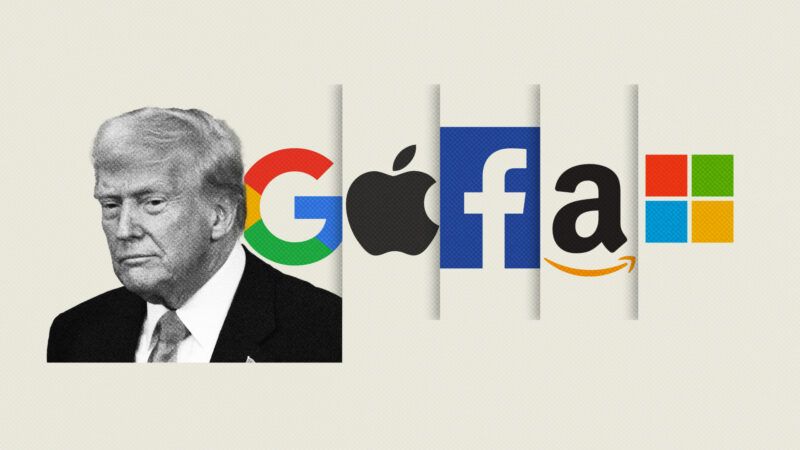Trump's Love-Hate Relationship With Big Tech
If Trump wants to encourage domestic investment, his antitrust appointees should ditch their Big Tech prejudice.

Apple announced on February 24 that it will spend and invest more than $500 billion in the U.S. over the next four years. President Donald Trump took to social media to credit his administration for the announcement. Without his policies, the president said, Apple "wouldn't be investing ten cents." However, Trump's antitrust and trade policies could be the very thing that prevents other large firms from making similar announcements.
Apple's plans include a 250,000-square-foot server manufacturing facility in Houston, which will power Apple Intelligence, its proprietary generative AI; doubling its U.S. Advanced Manufacturing Fund from $5 billion to $10 billion; hiring 20,000 Americans; and opening an Apple Manufacturing Academy in Michigan to help businesses implement AI and smart manufacturing techniques. A financial analysis conducted by The Wall Street Journal concludes that "Apple's announced figure is in line with what one might expect the company to be spending anyway."
Trump touted Apple's domestic spending commitment nonetheless, and Vice President J.D. Vance chastised European leaders for "tightening the [regulatory] screws on U.S. tech companies with international footprints" at the Paris AI Summit earlier this month. At the same time, Trump's Federal Trade Commission (FTC) and Department of Justice (DOJ) are perpetuating the presumptively anti–Big Tech antitrust framework implemented under Joe Biden.
Andrew Ferguson, Trump's confirmed chair of the FTC, announced a public inquiry into Big Tech censorship on Thursday. The FTC's request for public comment asks respondents to consider whether "platforms' adverse actions made possible by a lack of competition" and to what extent "platforms [used] their dominance…to prevent competition from platforms with different moderation policies."
The DOJ brought two major antitrust cases against Google and one against Apple during the Biden administration. Abigail Slater, Trump's nominee for assistant attorney general of the DOJ's antitrust division, said at her Senate confirmation hearing that she was "not familiar with the details of the Antitrust Division's lawsuits against Google and Apple." Two days before Slater's hearing, the Tech Oversight Project, a nonprofit "dedicated to reining in Big Tech," described her as "a strong candidate to [hold] Big Tech price gougers and monopolists accountable." Slater's hearing responses confirm this description: She responded in the affirmative to Sen. Sheldon Whitehouse's (D–R.I.) question if she'd "prioritize enforcement against Big Tech" and told Sen. Chuck Grassley (R–Iowa) that the tech industry should be a focus of the antitrust division.
Trump credited his threatened tariffs on Mexico with stopping Apple's construction of two semiconductor fabrication plants in Mexico while speaking to reporters on Friday. Trump said that "the tariffs are amazing," but encouraging firms to produce where they otherwise would not is nothing to celebrate. If Apple decided to build its plant in Houston in response to Trump's pending tariffs, then manufacturing in Mexico would have been less expensive in its absence; some percentage of these lower production costs would have translated to cheaper Apple products for American consumers. In celebrating tariffs as a tool of industrial policy, Trump is really celebrating higher prices. Prices are further hiked when tariffed countries respond in kind: China banned the export of rare materials used in semiconductors, solar panels, and batteries to the U.S. in December 2024 following American export controls on chipmaking tools.
Instead of engaging in distortive trade policy that makes Apple products more expensive, Trump can make domestic production more attractive by reducing the regulatory burden. Miring firms like Apple and Google in expensive antitrust litigation does the opposite.
Editor's Note: As of February 29, 2024, commenting privileges on reason.com posts are limited to Reason Plus subscribers. Past commenters are grandfathered in for a temporary period. Subscribe here to preserve your ability to comment. Your Reason Plus subscription also gives you an ad-free version of reason.com, along with full access to the digital edition and archives of Reason magazine. We request that comments be civil and on-topic. We do not moderate or assume any responsibility for comments, which are owned by the readers who post them. Comments do not represent the views of reason.com or Reason Foundation. We reserve the right to delete any comment and ban commenters for any reason at any time. Comments may only be edited within 5 minutes of posting. Report abuses.
Please to post comments


In celebrating tariffs as a tool of industrial policy, Trump is really celebrating higher prices.
You still don't get it. Trump's tariffs are magic. They protect domestic businesses, do not raise prices, and bring in enough revenue to replace the income tax. When will you guys learn?
How long before sarcjeff's garbage is indistinguishable from Hank? Put the rubbing alcohol down. Get help.
Trolling for attention. He's been very lonely since his wife and daughter left him.
Mouthwash more likely. No kidding.
True.
As-if you didn't just read that Apple will be building in Houston instead of Mexico.
You know what else makes prices cheaper?
Domestic Tax-Cuts and DOGE cutting the useless Gov-Grift shop.
But surely Reason can't support that. They have to run a 'protectionist' campaign for the International Trade Market being tax-exempt and open-borders! /s
I decided to give "Mute User" a go, and it's amazing. All the noise from the MAGA retards and the dumb Blue Anons is gone!
Whats wrong [D] politician (obviously by your screen name).
Did Reason refuse to implement your "Please Censor these Users" list?
So you had to resort to popularizing 'cancel' culture means?
4/7 Greybox Breakdown
TJJ2000
sarcasmic
Still early - but TJ takes this one.